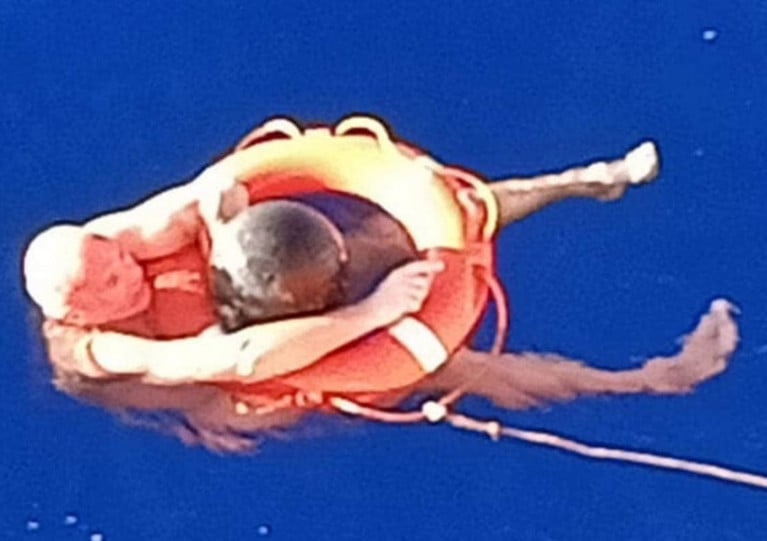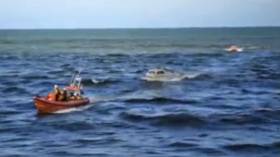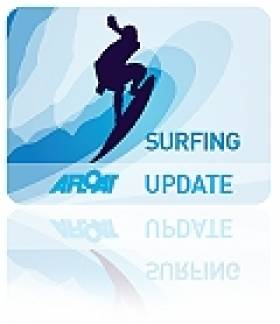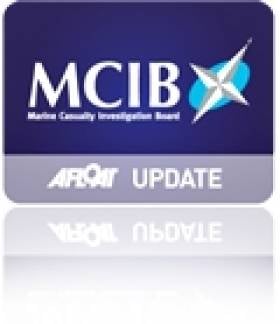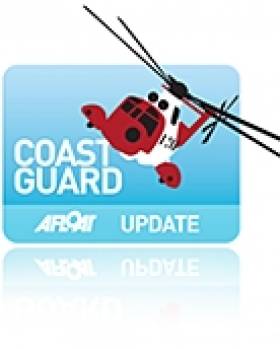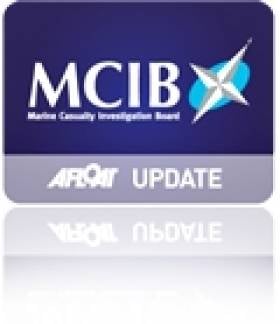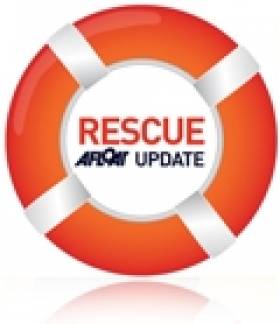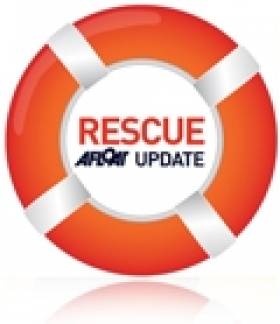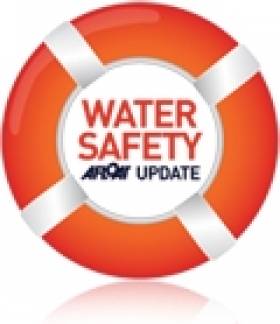Displaying items by tag: overboard
Man Survives 14 Hours In Pacific Clinging to Fishing Buoy
A man survived 14 hours in the Pacific by clinging to a fishing buoy after he fell overboard from a cargo ship.
Marine Industry News rounds up the stories on Vidam Perevertilov, the chief engineer on board the Silver Supporter who entered the water between New Zealand and the remote Pitcarin Islands on Tuesday 16 February.
As his ship sailed away unaware of his predicament, Perevertilov swam to a “black dot” on the horizon which turned out to be an abandoned fishing buoy.
Six hours later the alarm was raised and the ship used its logs to pinpoint Perevertilov’s location in the open sea, where he was adrift without a lifejacket.
Marine Industry News has more on the story HERE.
Man Dies After Two Go Overboard From Speedboat In Irish Sea
#IrishSea - A man has died after going overboard from a speedboat in the Irish Sea off Aberystwyth in West Wales yesterday morning (Wednesday 31 August).
Aberystwyth RNLI launched its Atlantic class lifeboat at 9.30am to reports of an empty speedboat circling in Cardigan Bay about 500m offshore.
The volunteer crew were swift to the scene to pull two men from the water into the safety of the lifeboat, and treatment of one of the casualties began immediately.
However, as Wales Online reports, despite the best efforts of rescuers, the man sadly died, while his companion was last reported in a stable condition at Bronglais Hospital.
HM Coastguard later assisted the lifeboat volunteers in their inshore rescue boat to gain control of the speedboat and bring it in to the marina.
Man Dies After Lobster Boat Incident Off Donegal
#Overboard - Breaking News reports that a man has died after falling overboard from a fishing vessel off Donegal this afternoon (Tuesday 16 June).
The deceased had been working on a lobster boat with a colleague off Horn Head when the incident occurred.
First on scene in the search and rescue operation was the Mulroy unit of the Irish Coast Guard, who recovered him from the water
He was then transferred to the Rescue 118 helicopter for airlift to Letterkenny General but was pronounced dead after arrival.
South African Surfer Stranded In Shark-Ridden Seas
#Surfing - A South African surfer has survived a terrifying ordeal after being stranded alone in shark-infested waters in the Indian Ocean.
As Channel 4 News reports, 50-year-old Brett Archibald had been with friends on an overnight boat crossing from mainland Indonesia to the surfing grounds of the Mentawai Islands when he blacked out from seasickness and fell overboard in rough weather.
Unfortunately for Archibald, his friends were either asleep or suffering from seasickness themselves below deck, and several hours passed before he was noticed missing.
In the meantime, he was stranded alone in the water, surrounded by sharks and jellyfish and attacked by seagulls.
Archibald described his 28 hours adrift at sea as "insane" and said he nearly drowned eight times, but he continued to swim and tread water while, unbeknownst to him, rescue services were being mobilised for a large-scale search operation.
Channel 4 News has much more on the story HERE.
Man Lost Arm After Going Overboard from RIB In Cork Harbour
#MCIB - A man who lost his arm when he fell overboard from his boat in Cork Harbour last summer could have avoided the accident if he had followed essential safety precautions, according to the official report into the incident. The full report is available to download below as a PDF document.
Owen Corkery of Carrigaline was the subject of a 'miracle rescue' on 9 June 2012 when he was thrown overboard from his RIB, which subsequently struck him several times after he entered the water near Haulbowline Island, causing serious injuries to his head, back and left arm.
As previously reported on Afloat.ie, the RNLI said Corkery was "incredibly lucky to have been spotted from the shore" by a man now known to be Paul Bryans, who had been looking through a telescope at Fort Camden in Crosshaven approximately a mile away from the site of the incident.
Bryans and colleague Dick Gibson immediately raised the alarm with the emergency services and Crosshaven RNLI respectively, and rescue crews were dispatched within minutes.
While the lifeboat volunteers took control of the wayward RIB, Corkery was quickly retrieved from the water by the crew of the Cork Harbour Pilot boat Sonia. They found him incoherent and bleeding heavily, and also noted that while he was wearing a working personal flotation device (PFD), he was not wearing warm clothes or shoes.
Corkery was transferred via ambulance to Cork University Hospital, where his left arm was later amputated just above the elbow due to the severity of his injuries.
According to the official report into the incident by the Marine Casualty Investigation Board (MCIB), the RIB was found to be undamaged but had no CE or other approval mark.
The kill cord on the boat's motor was also found to be malfunctioning, as the engine could be started whether or not it was attached, and did not shut off when removed.
The report states that Corkery - an experienced powerboat user who had not completed any recognised handling course - has since explained he was aware of the kill cord malfunction but continued to use the vessel.
He confirmed in the same interview with investigators that he was standing beside the helm of the RIB at the time of the incident, a position that "would have made him considerably more likely to be thrown from the vessel".
Investigators also found it likely that Corkery's lack of shoes would also have reduced his grip while standing on the floor of the RIB.
In its conclusions, the MCIB report - which is available to download below - emphasises that the kill cord is an "essential part of safety equipment for all open motorboats" that should always be used and checked regularly, and that the helm of any high-speed watercraft should always remain seated, even at low speeds.
It also recommends that all pleasure craft owners should complete a recognised powerboat handling course.
Search for Missing Spanish Fisherman Off Southwest
#Coastguard - The Irish Coast Guard's Rescue 115 helicopter was tasked overnight to search for a missing Spanish fisherman who fell overboard from his fishing trawler off the southwest coast in the early hours of this morning.
98FM is reporting the latest news on this incident, saying that the man went into the sea some 25 miles off Mizen Head.
The alarm was raised around 4am and the coastguard station at Valentia is co-ordinating the search and rescue effort, with RNLI lifeboats from Baltimore and Castletownbere in West Cork assisting.
Safety Advice for Leisure Boaters in MCIB's Helvick Head Report
#MCIB - The Marine Casualty Investigation Board (MCIB) has called for better safety awareness among leisure boat users in its report into the deaths of two men off Helvick Head in Co Waterford in May 2010.
John O'Brien and Pat Esmonde were lost overboard from their small RIB on 23 May 2010, and their remains were recovered two days later. Post-mortems confirmed that both died by drowning.
The report does not conclude exactly how the incident occurred. But accounts from eyewitnesses who sighted the men in the minutes before state that neither was wearing a lifejacket, despite the legal requirement to do so - and despite O'Brien having no seafaring experience and Esmonde being unable to swim, as confirmed by their families.
The MCIB also noted that while there were two lifejackets aboard the vessel, they were for emergencies and not suitable for constant wear as per the requirements for the vessel class.
Other safety issues highlighted include the kill-cord on the engine, which was not being used, and the fact that the initial distress call was made by mobile phone and not VHF radio.
Though neither had any bearing on this specific incident, the MCIB warned in particular that mobile phone calls are closed in nature, whereas VHF distress calls can be heard and answered by any vessel in the vicinity.
The board recommends that the Minister for Transport "undertakes a highly visible information poster campaign on piers and launching areas relating to lifejackets, VHF radio and emergency contact details" and also reminds boaters of their legal obligations.
The full report is available to download as a PDF from the MCIB website HERE.
Search for Fisherman in Irish Sea Enters Second Day
#RESCUE - The Irish Times reports that the search has resumed for a fisherman who fell overboard from a trawler in the Irish Sea yesterday.
The crewman of the Kilkeel-registered fishing vessel Zenith was reported missing some nine miles (14.5km) off Clogherhead, Co Louth.
Yesterday afternoon the Irish Coast Guard and Clogherhead RNLI began an air and sea search and rescue effort, assisted by coastguard helicopter and other lifeboats and vessels in the area.
The Irish Times has more on the story HERE.
Man in Serious Condition After Falling Overboard Off Clare
Breaking News reports that the individual was seen experiencing difficulty in the sea north of Kilkee, close to Donegal Point.
The Irish Coast Guard and Kilkee Marine Rescue Service immediately mounted a rescue operation, and the man was removed from the water by rescue helicopter to Limerick's Mid Western Regional Hospital.
The man is believed to be in a serious condition.
Report Into Loss of Janireh Crewman Now Online
The full report of the investigation into the loss of a crewman from the fishing vessel Janireh earlier this year is now available online.
Egyptian national Nadi Sehsaah died after falling overboard from the trawler some 20 nautical miles south west of Mizen Head. It is believed he was not wearing a flotation device at the time of the accident.
The Marine Casualty Investigation Board (MCIB) has said there is an onus on the fishing industry to improve safety standards across the board, according to the Irish Examiner - which has more on the story HERE.
The MCIB report is available to download HERE.


























